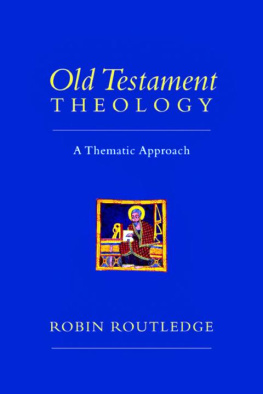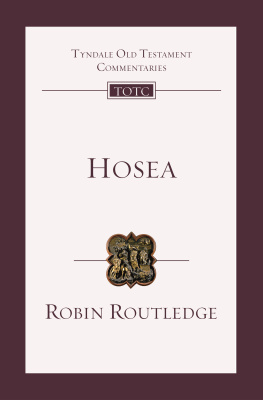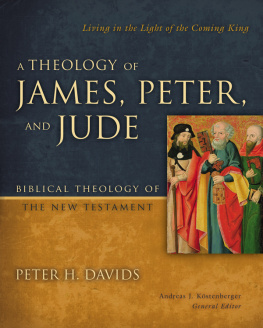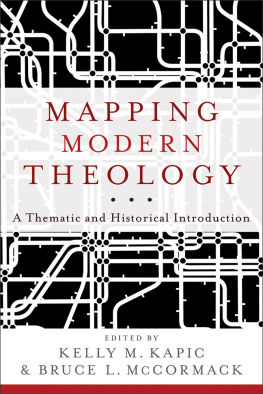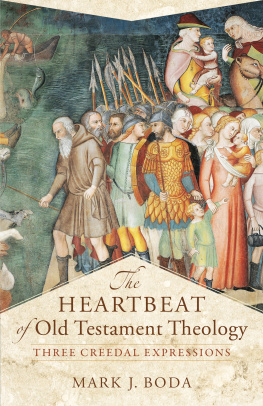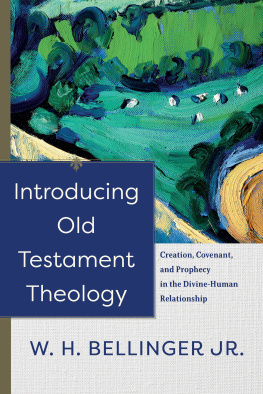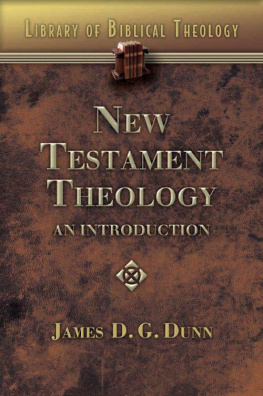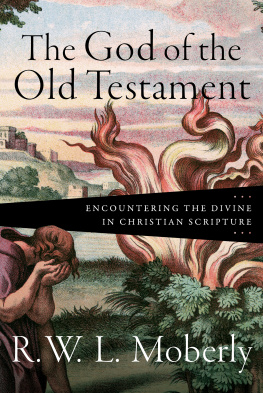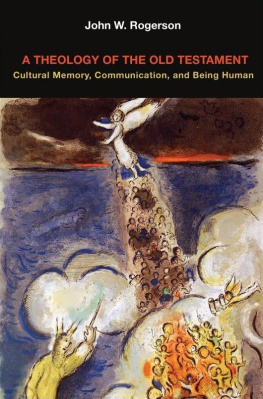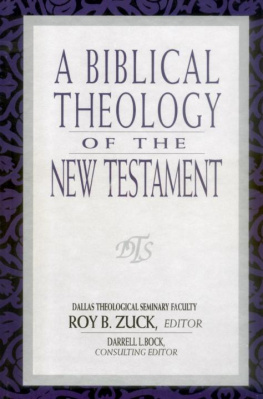Robin Routledge - Old Testament Theology: A Thematic Approach
Here you can read online Robin Routledge - Old Testament Theology: A Thematic Approach full text of the book (entire story) in english for free. Download pdf and epub, get meaning, cover and reviews about this ebook. year: 2013, genre: Religion. Description of the work, (preface) as well as reviews are available. Best literature library LitArk.com created for fans of good reading and offers a wide selection of genres:
Romance novel
Science fiction
Adventure
Detective
Science
History
Home and family
Prose
Art
Politics
Computer
Non-fiction
Religion
Business
Children
Humor
Choose a favorite category and find really read worthwhile books. Enjoy immersion in the world of imagination, feel the emotions of the characters or learn something new for yourself, make an fascinating discovery.
- Book:Old Testament Theology: A Thematic Approach
- Author:
- Genre:
- Year:2013
- Rating:4 / 5
- Favourites:Add to favourites
- Your mark:
- 80
- 1
- 2
- 3
- 4
- 5
Old Testament Theology: A Thematic Approach: summary, description and annotation
We offer to read an annotation, description, summary or preface (depends on what the author of the book "Old Testament Theology: A Thematic Approach" wrote himself). If you haven't found the necessary information about the book — write in the comments, we will try to find it.
Old Testament Theology: A Thematic Approach — read online for free the complete book (whole text) full work
Below is the text of the book, divided by pages. System saving the place of the last page read, allows you to conveniently read the book "Old Testament Theology: A Thematic Approach" online for free, without having to search again every time where you left off. Put a bookmark, and you can go to the page where you finished reading at any time.
Font size:
Interval:
Bookmark:

A Thematic Approach

ROBIN ROUTLEDGE

There are a great many useful books on OT Theology available, with new volumes appearing regularly. Often, though, they give too much information or too little. Many are large and daunting to the ordinary student or pastor, and because of their layout, which is often determined by their approach, information may be hard to access; others take a more introductory approach and do not deal with many of the theological issues and questions the OT raises. My aim is to bridge that gap, and provide a substantial overview of the main issues in OT Theology in the main body of the text, with more detailed discussion and references for further reading in the footnotes.
The material in this book belongs in the area of biblical theology. The principal concern in biblical studies is with the text, and I have tried to maintain that priority. MIy purpose, though, is to look at the theological significance of the text within its wider canonical context, noting unity and coherence within the OT (and to some extent between the OT and the Ni), while being aware of diversity. Due to lack of space, exegetical work is generally assumed, and references for some follow-up discussion are included. A brief outline of the relationship between exegesis and biblical theology within the overall hermeneutical task is given in the first chapter.
This book has grown out of a teaching context. Over the years, I have adapted material to meet the needs of students, and in writing I still have those students in mind. As a Christian minister, I hope too that the material here will be of benefit to others who want to take the theological content of the OT seriously, and to apply its message to the life and ministry of the church.
In recording dates, I have used the designations AD and BC rather than the more widespread CE and BCE. This decision has a theological basis. As a Christian, I believe that the coming of Jesus Christ has marked a turning point in the history of the world, and that is reflected in the transition from BC to AD. The OT has significance in its own right, but looks forward to fulfilment in Christ. In my view that forward look, and the expectation of the OT's ultimate fulfilment in Christ, is better reflected in the designation BC than in the theologically neutral BCE.
This book is the result of many years of work, and I am very grateful to those who have helped me reach this point. I want to acknowledge my particular indebtedness to Martin Selman, teacher, mentor and friend, who inspired and nurtured my love of the Old Testament. Special thanks, too, to John Rogerson, my PhD supervisor at Sheffield University, for his wisdom, guidance and encouragement. I am grateful, too, to other friends and colleagues at Mattersey Hall, the International Baptist Seminary, Prague, and Bangor University, who have also helped, supported and encouraged me along the way. Thanks, too, to the students at Mattersey Hall, past and present, whose comments and questions have kept me on my toes and helped me develop this material in a way that, I trust, will be useful to them and to others; and who have kept me focused on the real reason for all of our work: building the kingdom of God.
My thanks, too, to Philip Duce and the team at IVP for their support, and for their hard work and patience in bringing this material to publication.
And last, but by no means least, thanks to my parents; to my children, Philip and Rebekah, who have seen far less of me than they might have hoped for over the last year or so; and to my patient and long-suffering wife, and best friend, Ailsa, who is glad that someone may finally read what I have spent hours locked in my study writing - when I could have been cutting the grass!
i. See e.g. Bernard W. Anderson, Contours of Old Testament Theology (Minneapolis: Fortress, 1999), pp. 1-47; Gerald Bray, Biblical Interpretation Past and Present (Leicester: Apollos; Downers Grove: IVP, 1996); E E Bruce, 'The Theology and Interpretation of the Old Testament', in G. W Anderson (ed.), Tradition and Interpretation: Essays by Members of the Society for Old Testament Study (Oxford: Oxford University Press, 1979), pp. 385-416; Walter Brueggemann, Theology of the Old Testament: Testimony, Dispute, Advocacy (Minneapolis: Fortress, 1997), pp. 1-114; Brevard S. Childs, Old Testament Theology in a Canonical Context (London: SCM, 1985); Biblical Theology of the Old and New Testaments: Theological Reflection on the Christian Bible (London: SCM, 1992), pp. 3-106; Ronald E. Clements, ,4 Century of Old Testament Study (London: Luttercvorth, 1976); Old Testament Theology: A Fresh Approach (London: Marshall, Morgan & Scott, 1978), pp. 1-25; Gerhard F. Hasel, Old Testament Theology: Basic Issues in the Current Debate, 4th ed. (Grand Rapids: Eerdmans, 1991); Paul R. House, Old Testament Theology (Downers Grove: IVP, 1998), pp. 11-57; Edmond Jacob, Theology of the Old Testament (London: Hodder & Stoughton, 195 8), pp. 11-36;R. W L. Moberly, `Theology of the Old Testament', in David W Baker and Bill T. Arnold (eds.), The Face of Old Testament Studies: A Survy of Contemporary Approaches (Leicester: Apollos; Grand Rapids: Baker, 1999), pp. 452-478; see also introductory articles in NIDOTTE 1:14-205.
The Old Testament as Christian Scripture
The Christian Bible comprises the Old and New Testaments and, from earliest times, Christians have accepted the OT alongside the NT as canonical and normative for faith. It is impossible, here, to trace the growth and development of the OT canon. Its make-up was essentially as we know it by the NT period,
`Old Testament' or `Hebrew Bible'?
and he too notes the importance of Jewish tradition, including Midrash and Talmud. Another issue is the centrality of the quest for unity in biblical theology. Levenson maintains that Judaism recognizes, and is happy to live with, tension and inner argument within the text. A third issue raised by Levenson is the emphasis in theology on belief over practice.
Font size:
Interval:
Bookmark:
Similar books «Old Testament Theology: A Thematic Approach»
Look at similar books to Old Testament Theology: A Thematic Approach. We have selected literature similar in name and meaning in the hope of providing readers with more options to find new, interesting, not yet read works.
Discussion, reviews of the book Old Testament Theology: A Thematic Approach and just readers' own opinions. Leave your comments, write what you think about the work, its meaning or the main characters. Specify what exactly you liked and what you didn't like, and why you think so.

